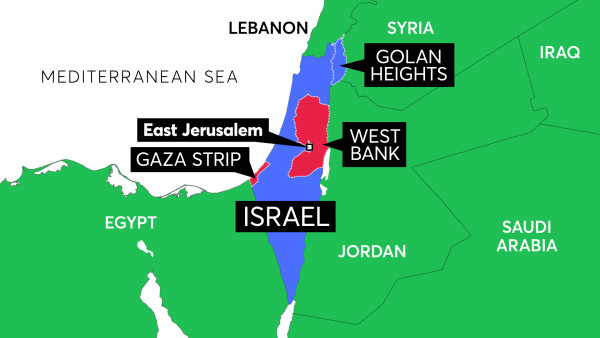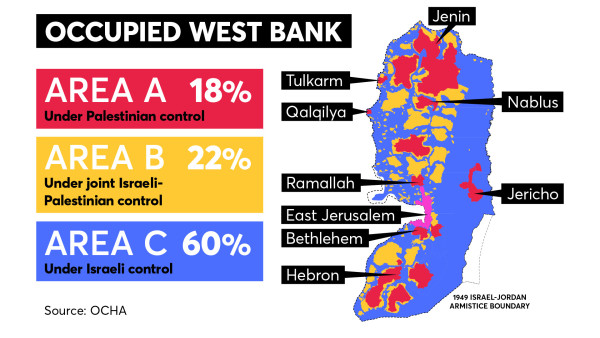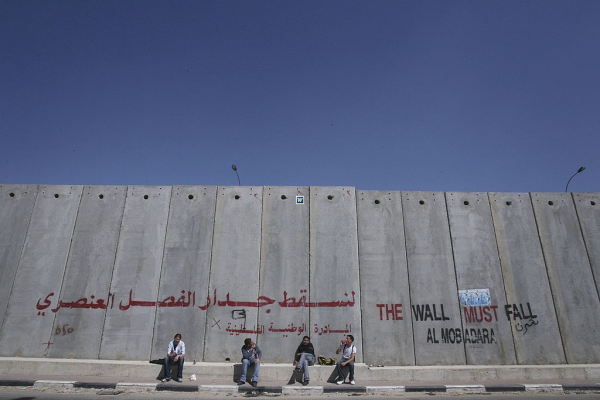While all attention has been focused on Gaza, there’s been a surge of violence in another Palestinian territory - the occupied West Bank.
For decades, lives have been upended there but things have gotten much more violent since the October 7 attack where Hamas militants crossed from Gaza into Israel killing 1200 Israelis and taking more than 200 hostage.
Israel responded with a massive bombing campaign and ground invasion which has killed at least 15,000 people so far. Most of the dead are women and children.
Here we outline what life is like in the West Bank and how violence is getting worse.
Where is the occupied West Bank?
The West Bank is a chunk of Palestinian territory that has been occupied by Israel for more than 50 years.
It is bordered by Israel to the south, north and west, and Jordan and the Dead Sea to the east.
It’s named the West Bank because it is west of the River Jordan and East Jerusalem is technically considered part of the West Bank but Israel formally annexed it in 1980.

A map showing where the West Bank is. Image: Re: News
Under a proposed two state solution, which would see an independent Palestinian state sit alongside Israel, the West Bank would form the heart of an Arab state.
In 1947, the UN voted to divide what was Palestine into those two states (you can read our Gaza explainer here about the events that led to the decision) but several wars followed and those conflicts changed things.
The 1967 war between Israel and Egypt, Jordan and Syria ended in a decisive victory for Israel in just six days and with that big win came big land grabs.
It was in the aftermath of the Six Day War, as it’s known, that Israel began occupying the West Bank.
Roughly three million Palestinians and about 700,000 Jewish Israeli settlers (we’ll explain who they are later) live in the Occupied West Bank, according to the UN Human Rights Council.
After the Oslo peace accords in 1993, the West Bank was divided into three sections:
A, B and C.
Area A makes up about 18% of the West Bank and is supposed to be governed by the Palestinian Authority (PA) - more on them later.
Area B makes up about 21% and the PA controls health, security and education.
About 2.8 million Palestinians live in Areas A and B and the major Palestinian cities and towns of Ramallah, Bethlehem, Nablus and Hebron fall within these areas.
Area C: This is the biggest chunk of land in the West Bank, taking up about 60%, and it is home to the majority of Israeli settlers.
Control of this area was supposed to be transferred to the PA in 1999 as per the Oslo Accords but this never happened. So Israel still completely controls it and still has overall control of Areas A and B too.

This image shows Area A, B and C. Image: Re: News
What has happened during Israel’s occupation?
A number of human rights organisations, including Amnesty International, Human Rights Watch and Israeli NGO B’tselem, have issued scathing reports of Israel’s ongoing occupation of the West Bank - and all three have accused Israel of carrying out a system of apartheid in the occupied Palestinian territories.
In a 2021 report, Human Rights Watch accused Israel of abusive policies that constitute crimes of “apartheid and persecution” in the occupied territories, including the West Bank.
Amnesty International followed a year later, saying a combination of land confiscation, illegal settlement and dispossession along with “rampant discrimination” have inflicted “immense suffering on Palestinians, depriving them of their basic rights”.
And B’tselem says after considering the accumulation of policies and laws that Israel has used to “entrench its control over the Palestinians”, it reached the conclusion that Israel had met the bar for being called an apartheid regime.
Some former high-level Israeli officials have also used the term. The former head of Israel’s intelligence agency Mossad, Tamir Pardo said: “There is an apartheid state here.” While former Israeli attorney general Michael Ben-Yair agreed: “I must also conclude that my country has sunk to such political and moral depths that it is now an apartheid regime.”
Rights groups say this plays out in a number of ways
Amnesty says every aspect of Palestinians’ daily life can be interrupted by the military rule Israel imposes as an occupying force.
“It continues to affect whether, when and how Palestinians can travel to work or school, go abroad, visit their relatives, earn a living, attend a protest, access their farmland or even access electricity or a clean water supply. It means daily humiliation, fear and oppression.”
Controlling the daily movement of Palestinians by making them get permits to travel to different areas is a big part of it.
Israel also makes Palestinians get permits to travel to certain areas to carry out daily errands and there are also military checkpoints which Palestinians have to travel through in the West Bank as well as to get into Israeli territory.
This military style rule also sees Israel apply civilian criminal law to Palestinian children but does not do the same for Israeli children.
A report by Save the Children says Palestinian children are the only children in the world who are arrested, detained and then forced to face a military-style court.
It also says they also have evidence of children being beaten, blindfolded and abused while in custody.
According to Defense for Children International - Palestine, Israel’s military has detained, interrogated and imprisoned approximately 13,000 Palestinian children.
According to the UN Children’s Fund (UNICEF) report Children in Israeli Military Detention Observations, ill-treatment of children held by Israeli forces is “widespread, systematic and institutionalised”.
Israel also built what is known as the Separation wall or West Bank barrier - which snakes through the West Bank.
It was built by Israeli authorities after the Second Intifada which was a major and often violent uprising by Palestinians against the Israeli occupation that lasted from September 2000-2005.
Suicide bombings were a key feature of the heightened violence and killed hundreds of Israelis. Israel says the barrier is a necessary form of protection but Palestinians say it is another form of racial segregation and eats into more of their territory.

The barrier wall, built by Israeli authorities after the Second Intifada, divides the West Bank. (Photo: Associated Press)
Israel has rejected claims of apartheid
It described Human Rights Watch as having a “long-standing anti-Israeli agenda”, while calling its report a “propaganda pamphlet”.
The pro-Israel Anti-Defamation League also says Israel’s actions don’t equate to apartheid because they are based on security concerns rather than racism: “While Israel’s policies and practices can certainly be criticised, it is not factually accurate to say they are akin to a permanent and institutionalised system motivated and designed by racism.”
The issue of military raids
Even though the PA is supposed to control Areas A and B, Israel still controls its security and as a result is able to carry out raids or detain people and justifies it for security reasons.
Last year Israeli security forces killed 155 Palestinians making it the deadliest year for Palestinians in the occupied West Bank.
And since the October 7th Hamas attack, violence against Palestinians has surged.
In the seven weeks since, at least 206 Palestinians have been killed, according to the Palestinian Health Ministry.
That’s in part because Israel has stepped up its military raids, but it’s also put curfews in place for Palestinians only in Hebron and installed more checkpoints.
Those military raids can also end in arrest for Palestinians.
In a statement released by Amnesty on November 8, the organisation said Israeli authorities dramatically increased their use of detention and arbitrary detention of Palestinians across the West Bank.
Arbitrary detention is when a person is arrested and detained by a government or military force without being charged or getting a fair trial. There is no time limit so people can be kept in prison with no judicial oversight indefinitely.
In July, the UN Special Rapporteur for human rights in the occupied Palestinian territories said 800,000 Palestinians had been arrested and detained since 1967, including children as young as 12.
“Palestinians are presumed guilty without evidence, arrested without warrants, detained without charge or trial very often, and brutalised in Israeli custody,” Francesca Albanese said.
Israel’s permanent mission to the UN in Geneva dismissed the report.
“Israel does not expect any fair, objective or professional treatment from this Special Rapporteur who was chosen due to her partial views against Israel,” the mission said in a statement to Reuters.
Since October 7 though, Israeli forces have detained more than 3200 Palestinians, according to NGO the Palestinian Prisoners’ Club and the number held in administrative detention (without charge or trial) rose from 1319 to at least 2070.
The Israeli military says that’s because it’s responding to a “significant rise in terrorist attacks” in the West Bank.
In one overnight operation in the West Bank’s Balata refugee camp near Nablus, Israel’s military and Shin Bet (Israel’s security service) said in a joint statement to the Times of Israel that they carried out the deadly raid because a “number of terrorists” were planning “imminent attacks on Israeli civilians and troops”.
The Israeli military told the Associated Press that extra checkpoints were set up “as part of the security operations in the area.”
This is a snapshot of some of what has been going on in the occupied West Bank and the above reports provide more detail. But it’s Israel’s settlement policy that has drawn the most international criticism.
What are settlements?
There are international humanitarian rules which an occupying force is supposed to abide by. For example, it is illegal for occupying forces to confiscate private property, and the destruction or seizure of property is prohibited.
Families or individuals being transferred by force from and within the occupied territory are not allowed.
Israel’s practice of demolishing Palestinian homes and forcing Palestinian families out in order to build new settlements exclusively for Jewish Israeli settlers has been condemned as being illegal under international law.
Human rights organisations say Israel’s policy of constructing and expanding illegal settlements on occupied Palestinian land is one of the main driving factors resulting in mass human rights violations.
The settlement issue is one area that the United States under Biden’s administration - a key Israel supporter - has criticised Israel for.
In June, US Secretary of State Antony Blinken described the settlements as “an obstacle to the horizon of hope we seek”, while speaking to the pro-Israel lobby group AIPAC.
That’s because it complicates the path to a two-state solution, as mentioned above.
The more Jewish settlers that move onto Palestinian land, cut through communities and take over access to Palestinian resources, the harder it is for a Palestinian state to be realised.
Amnesty estimated in 2017 that Israel had confiscated 100,000 hectares of land from Palestinians and demolished 50,000 homes or structures in the West Bank, kicking out the Palestinians who lived there.
“It has also diverted Palestinian natural resources such as water and agricultural land for settlement use.”
And Israel has ramped up its settlement drive over the last 10 years.
In 2019, Prime Minister Benjamin Netanyahu outlined a plan to annex parts of Area C which has the Jordan Valley and northern Dead Sea region.
Netanyahu made the pledge in the final week ahead of a tightly contested election.
He said the annexation could start “immediately after the election if I receive a clear mandate to do so from you, the citizens of Israel”.
The current Netanyahu government took office in December last year and has ties to religious and ultranationalist politicians who are closely connected to the settlement movement.
Some of the settler campaign groups believe it is Palestinians who are the ones constructing illegal buildings on the land.
One of those groups is Regavim which describes itself as a movement to “prevent illegal seizure of state land”.
The head of Regavim’s International Division, Naomi Kahn told Channel Four her vision for Area C would allow Palestinians to live there but they could only vote in local elections and they would have Jordanian citizenship.
Who are the settlers?
Settlers are Jewish immigrants from other countries or other parts of Israel who move into purposefully built settlements in the West Bank.
They come from a mixture of places but last year the number of American immigrants moving into illegal settlements in the occupied West Bank tripled compared to 2021, according to Israel’s Central Bureau of Statistics.
There are about 700,000 Israeli settlers living illegally across the West Bank in 279 settlements, including 14 settlements in East Jerusalem. About 147 of those settlements are outposts, which are illegal even under domestic law in Israel, according to the UN.
The difference between a settlement and an outpost is the Israeli government authorises settlements while outposts are built without government authorisation.
Those settlements include homes, infrastructure and roads that slice through Palestinian land.
One settler outpost called Oz Zion was built on land legally registered to Palestinians, according to this BBC report from August.
One of the settlers living there told the BBC the settler strategy is to stop the creation of a Palestinian state which was “being built in practice without asking anyone”.
This jump in settlement expansion has been accompanied by a spike in settler violence, according to an EU report from May.
And it’s taken a more extreme turn since the October 7 Hamas attack.
Less than a week later, Israel’s Security Minister Itamar Ben-Gvir - who is himself a settler - started handing out assault rifles to settlers and “civilian security teams” and directed the Ministry of National Security to purchase 10,000 firearms.
They’ve been given out on the basis that civilians need to protect themselves to prevent a repeat of the Hamas attacks on southern Israeli towns, where unarmed civilians were forced to defend themselves before security forces got there.
But B’tselem says it’s part of a “state-backed wave of settler violence which has led, and is leading to, the forcible transfer of Palestinian communities in the West Bank”.
The Palestinian Health Authority says settlers have killed nine Palestinians since the Hamas attack on October 7.
Human rights groups have highlighted the killing of Palestinian olive farmer Bilal Muhammed Saleh as a reflection of this type of violence. Salah was killed by settlers south of Nablus last month, while tending to his trees which are an important form of income for Palestinian families in the area.
This report from CNN shows settlers firing on a Palestinian home in Nablus while this report shows families being “chased” out of their homes after being violently targeted by settlers who are already cutting their water supplies and allegedly coming into their homes and threatening them at night.
Even US President Joe Biden and his officials have condemned the settler violence while endorsing Israel’s campaign in Gaza: “It has to stop. They have to be held accountable. It has to stop now ”.
Who is in charge of the West Bank?
The Palestinian Authority (PA) is supposed to be in charge of the West Bank and to explain its role we need to rewind to the Oslo Accords in 1993.
The Oslo Accords was the first direct peace agreement between the Palestinian Liberation Organisation (PLO) then led by Yasser Arafat and Israel’s government led by Yitzah Rabin.
The agreement was supposed to be a starting point to negotiate a future Palestinian state as part of a two-state solution - but that has never materialised.
The PLO is an umbrella organisation which says it represents Palestinians worldwide and the main political party within it is Fatah.
The PA was born out of Fatah and was set up in what was supposed to be an interim governing body to lead the Palestinians towards statehood with East Jerusalem as the capital and based on the outcome of the Six Day War.
Fatah also used to control the Gaza strip but lost parliamentary elections to Hamas in 2006.
Fatah is secular, recognises Israel and wants to build a state based on 1967 borders, unlike Hamas which favours an armed struggle and does not recognise Israel.
The Palestinian Authority is currently led by Mahmoud Abbas who has enjoyed international backing but he and the PA itself are largely regarded as tokenistic, incompetent and unpopular among many Palestinians.
A 2021 poll from the Palestinian Center for Policy and Survey Research found that 78% of Palestinians wanted Abbas to resign while just 19% think he should remain in office.
The Palestinian Authority has ministries and civil services but ultimate control of the West Bank still falls to Israel as the occupying military force.
All of these factors have created a combustible mix of tension, dispossession and deadly violence in the occupied West Bank.
More stories:
How to make sense of what’s going on in Gaza
The violence over the past two weeks is the result of decades of tension over the disputed region.
Thousands march in pro-Palestinian and pro-Israeli rallies across NZ
Rallies were held across the country.